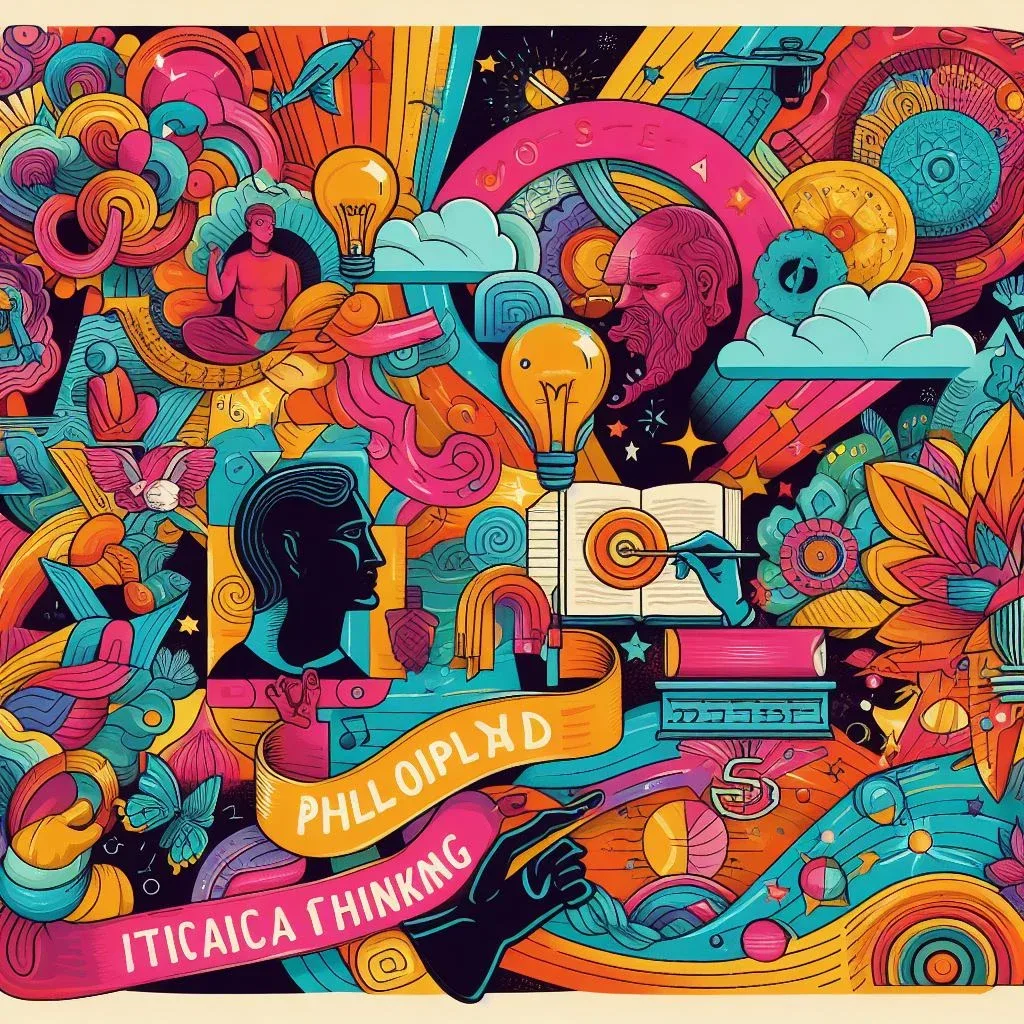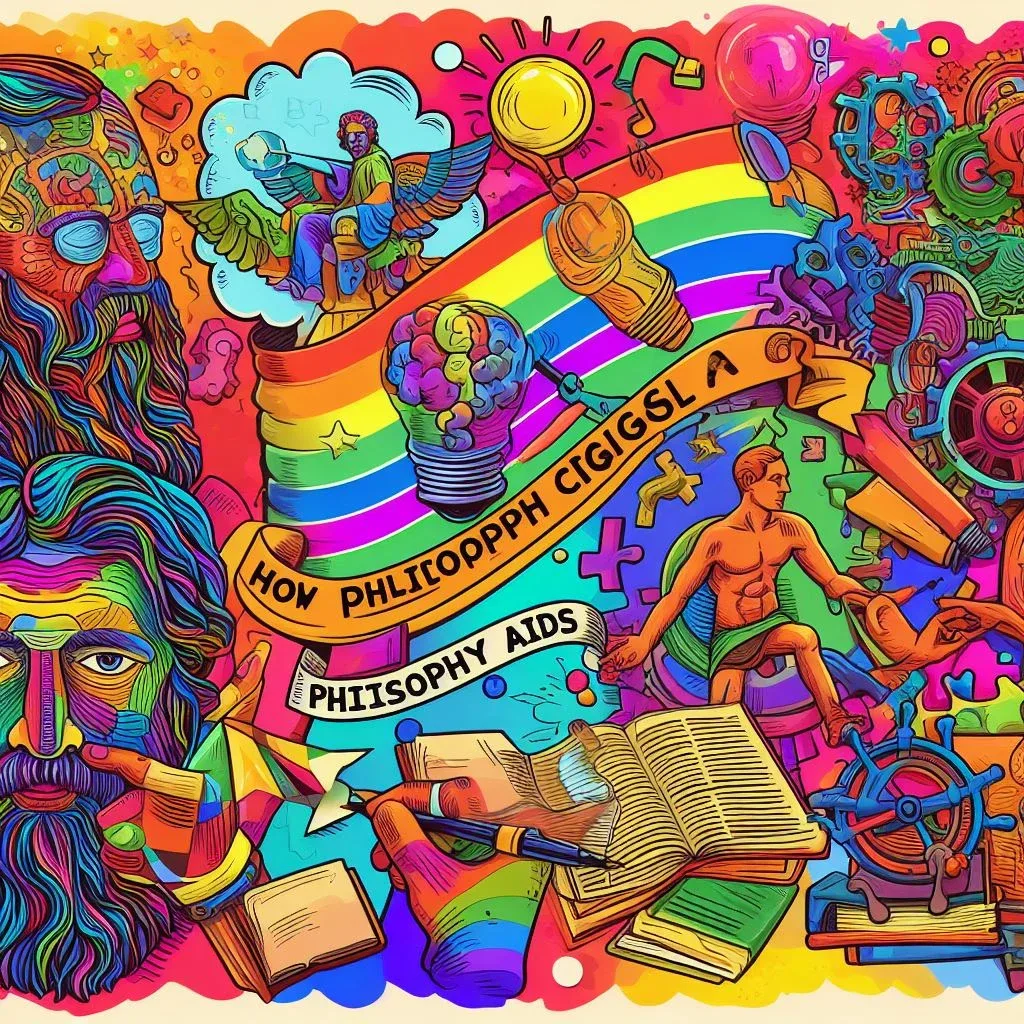Philosophy is not just an academic field of study; is a powerful tool that enhances critical thinking. It teaches us to question the status quo, analyze complex arguments and reflect deeply on fundamental questions of human existence. This article explores how philosophy significantly contributes to the development of critical thinking, an essential component in the age of information and argumentation.

The Philosophical Root of Critical Thinking
Critical thinking is, at its core, a philosophical discipline. From Socrates, who urged his interlocutors to question their deepest beliefs, to modern analytical philosophers who deconstruct the processes of thought and language, philosophy has been the birthplace of critical thinking. When studying philosophy, we learn the importance of asking “why?” and “how do we know?”, thus challenging the premises and logic underlying the arguments.
Logical Structures and Reasoning
Philosophy educates us about the foundations of logic, an essential tool for critical thinking. Understanding formal and informal logic helps us identify fallacies in arguments and construct our own claims in a coherent and justifiable way. The study of philosophical logic provides a solid basis for evaluating the validity and strength of arguments, a fundamental ability in any field of critical analysis.

Ethics and Values in Critical Analysis
Ethics, one of the main branches of philosophy, encourages critical thinking by forcing us to consider the moral implications of our actions and beliefs. By exploring varied ethical theories, from Kant to Mill, we gain a deeper understanding of how our values influence our decisions and judgments. This capacity for ethical reflection is a key component of effective critical thinking.
The Philosophy of Science and Healthy Skepticism
Philosophy of science deals with the bases and nature of scientific knowledge and methodology. The study of this philosophical area develops a healthy skepticism, where we question how knowledge is obtained, the methods used to obtain it and the reliability of the sources. Skepticism is not the rejection of information, but critical questioning that seeks truth through evidence and reasoning.
Teaching Philosophy and Developing Critical Skills
The introduction of philosophy into education can have a significant impact on the development of students' critical thinking. Studies show that teaching philosophy to children and adolescents improves their reasoning skills, reading comprehension and even mathematics, as philosophy teaches them to analyze and argue in a logical and structured way.

Critical Thinking in the Digital Age
In the digital age, where information is abundant and not always reliable, critical thinking has become an even more valuable skill. Philosophy provides us with the tools to navigate this sea of information, evaluating the credibility of sources, the solidity of arguments and the validity of “fake news”. Therefore, philosophical critical thinking is essential to discern what is true and what is false online.
Conclusion: Philosophy as the Foundation of Critical Thinking
Philosophy not only aids critical thinking; it is fundamental to its existence. By studying philosophy, we acquire the skills necessary to question, analyze, and evaluate — skills that are indispensable in all areas of life. Philosophy teaches us not to act
take things as given, but seek to understand the world in a more meaningful and grounded way.
This article sought to highlight how philosophy is intrinsically linked to critical thinking. Through its various branches, philosophy teaches us to question and reflect — essential skills in an increasingly complex world. By promoting critical thinking, philosophy enables us to be more informed, empathetic citizens and capable of facing the challenges of the XNUMXst century.
FAQ: How Philosophy Helps Critical Thinking
Welcome to the FAQ section of our article “How Philosophy Helps Critical Thinking”. Here, we will seek to clarify common doubts and deepen understanding of the intrinsic relationship between philosophy and critical thinking, providing detailed answers that complement the information presented in the text. If you have any further questions after reading this, feel free to seek more knowledge in the vast fields of philosophy.


1. What is critical thinking and how does philosophy influence it?
Critical thinking is the process of analyzing and evaluating a statement to decide its validity or truth. Philosophy directly influences this process by providing tools such as logic, ethics and epistemology, which help to question arguments, identify fallacies and develop clear and well-founded reasoning.
2. Why is logic important for critical thinking?
Logic is crucial to critical thinking as it is the system by which we evaluate the coherence and validity of arguments. Philosophy teaches the logical structures that allow us to discern whether conclusions validly follow premises and whether the premises are true.
3. How does philosophical ethics improve critical thinking?
Philosophical ethics improves critical thinking by introducing the dimension of values and moral consequences into the decision-making process. It encourages us to consider not only the truth of a statement, but also its impact and justice.
4. How does philosophy of science contribute to healthy skepticism?
Philosophy of science teaches us to understand the foundations of scientific knowledge, including its limitations and the nature of scientific evidence. This fosters healthy skepticism, which is the reasoned questioning of claims and the search for evidence before accepting conclusions.
5. What is the impact of teaching philosophy on the development of young people?
Teaching philosophy to young people has a profound impact on developing critical thinking skills. When learning to philosophize, young people practice questioning, analyzing concepts and constructing logical arguments, which benefits reasoning in all areas of knowledge.
6. Can philosophy help in discerning information in the digital age?
Yes, philosophy is a valuable ally in discerning information in the digital age. By applying philosophical critical thinking, we can better evaluate the credibility of sources, the validity of the arguments presented, and the truth of the information we receive online.
7. How can the study of philosophy help in professional life?
In the professional environment, critical thinking is essential for solving problems, making decisions and innovating. Philosophy promotes these skills by encouraging critical analysis of situations, ethical evaluation of actions, and the development of creative, well-founded solutions.
8. Which philosophers are essential to understanding critical thinking?
Philosophers such as Socrates, Plato, Aristotle and Descartes are fundamental for anyone who wants to understand and practice critical thinking. They developed methods and theories that are still the basis of critical and logical analysis today.
9. Is philosophical critical thinking different from other forms of critical thinking?
Philosophical critical thinking is unique in its fundamental and comprehensive approach. While other forms of critical thinking may focus on specific contexts or particular skills, philosophical critical thinking seeks a deep understanding and evaluation of
concepts, arguments and beliefs.
10. How can I begin to apply philosophical critical thinking in my daily life?
Starting to apply critical thinking in daily life involves cultivating curiosity, learning to question constructively, and practicing logical reasoning. You can start by reading philosophical texts, participating in debates and reflections and applying the principles of logic and ethics in everyday decisions.





